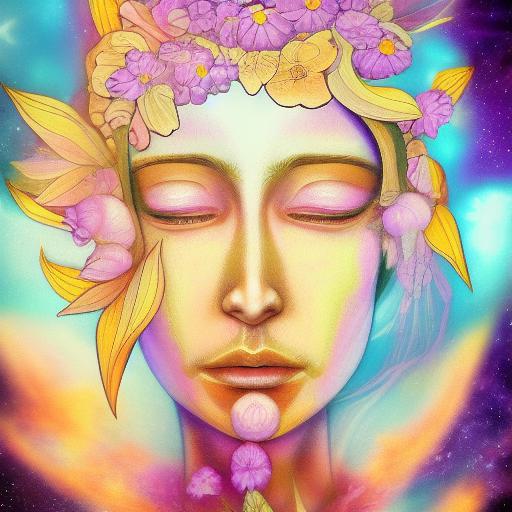How to write this prompt?
Here’s a breakdown of the prompt and how each individual part influences the image being generated:
- “Psychedelic Art” – This sets the overall tone and style for the image. The AI will likely generate an image that is vibrant, colorful, and abstract.
- “A painting of a weeping woman with a flower in her hand” – This is the focal point of the image. The AI will generate an image of a woman who is crying and holding a flower, which could evoke feelings of sadness, loss, or grief.
- “A digital painting inspired by Amanda Sage” – This is a reference to a specific artist, and suggests that the AI should create an image that is similar to Amanda Sage’s style of art. This could mean that the image will have a dreamlike or surreal quality to it.
- “Artstation contest winner” – This indicates that the prompt is based on a specific piece of artwork that won a contest on the website Artstation. The AI may use this as a reference point to create an image that is similar in style or theme.
- “Fantasy art” – This suggests that the image should have elements of fantasy, such as mythical creatures, magic, or otherworldly landscapes.
- “Elven spirit meditating in space” – This is a specific image that the prompt is referencing. The AI may use this as inspiration to create an image that features an elven spirit meditating in a space-like setting.
- “Digital 2d fantasy art” – This specifies the medium and style of the image. The AI will create a digital 2D image that fits within the realm of fantasy art.
- “Fantasy art style” – This is similar to “digital 2d fantasy art,” but further emphasizes that the image should have a distinct style that is associated with fantasy art.
Overall, the prompt is a combination of specific references and more general suggestions for the AI to follow. Each individual part of the prompt contributes to the overall image being generated. By breaking down the prompt and analyzing each part, you can understand how to write a prompt that effectively communicates your desired image to the AI.
What is the meaning behind psychedelic art?
Psychedelic art is a form of visual art that is inspired by the use of psychedelic drugs. It typically features bright colors, abstract patterns, and surreal imagery. The purpose of psychedelic art is to create a sense of altered consciousness or spiritual exploration.
How to create a digital 2D fantasy art?
To create a digital 2D fantasy art, you can use a variety of digital art software such as Photoshop, Procreate, or Clip Studio Paint. Start by sketching out your idea and then refine it using digital tools. Use layers to separate different elements of the image and experiment with different brushes and textures to create a unique look.
Who is Amanda Sage and what is her art style?
Amanda Sage is an American artist who is known for her psychedelic and surrealist paintings. Her artwork often features dreamlike images and intricate details. She is influenced by the works of artists like Salvador Dali and Alex Grey, and her style is characterized by vibrant colors and complex patterns. Her paintings have been featured in galleries and exhibitions around the world.
Can AI art generation prompts be used for educational purposes?
Yes, AI art generation prompts can be used for educational purposes in a variety of ways. Here are a few examples:
1. Teaching art history: AI can generate images that are similar to famous works of art, allowing students to compare and contrast different styles and movements.
2. Inspiring creativity: By giving students a prompt and having them create their own AI-generated art, educators can encourage students to think outside the box and explore new forms of creativity.
3. Exploring technology: Using AI art generation prompts can help students learn about the technology behind artificial intelligence and how it is used in the art world.
4. Developing critical thinking skills: Analyzing AI-generated art can help students develop critical thinking skills by encouraging them to assess the accuracy, quality, and meaning behind the generated image.
How can AI-generated art be used to inspire or inform other forms of creative expression?
AI-generated art can be used to inspire and inform other forms of creative expression in several ways. Here are a few examples:
1. Collaboration: AI-generated art can inspire collaboration between humans and machines, allowing artists to explore new forms of creativity and push the boundaries of traditional art.
2. Exploration of new styles and techniques: AI-generated art can introduce artists to new styles and techniques that they may not have explored before.
3. Inspiration for storytelling: AI-generated art can inspire writers and storytellers to create new narratives based on the images or themes present in the generated art.
4. Exploration of new mediums: AI-generated art can inspire artists to explore new mediums, such as virtual reality or augmented reality, to create interactive and immersive art experiences.
Looking to add some cutting-edge creativity to your designs? Look no further than Visual Paradigm Online! With our innovative design tools, you can seamlessly incorporate stunning AI-generated art into your graphics with just a few clicks. Our user-friendly interface and extensive range of design templates and assets make experimentation a breeze, so you can explore countless styles and layouts until you find the perfect combination for your project. Elevate your designs to the next level with Visual Paradigm Online today!


